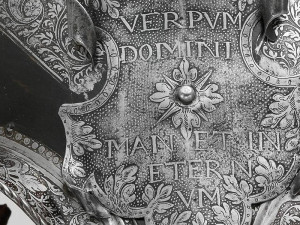by Rev. Christopher Maronde
 As the sixteenth century dawned, there were essentially three answers given to the question: who rules the Church? The first answer given was the most obvious to those who have even a passing acquaintance with the history of the Reformation: the pope. Martin Luther was baptized and ordained into a Church where the pope was the unquestioned head. But despite the assertion of medieval Roman apologists, historical evidence shows that the power and authority of the pope didn’t exist from the very beginning of the Church, even (as they asserted) back to Saint Peter. Instead, the growth of the pope’s power was a slow, conflict-filled process that lasted throughout the Middle Ages. By the time of Luther and the Reformation, the pope had emerged triumphant over the other two options: councils and kings. Both the councils and kings had experienced their own heyday of authority over the Church, but both had been ultimately defeated by the papacy.
As the sixteenth century dawned, there were essentially three answers given to the question: who rules the Church? The first answer given was the most obvious to those who have even a passing acquaintance with the history of the Reformation: the pope. Martin Luther was baptized and ordained into a Church where the pope was the unquestioned head. But despite the assertion of medieval Roman apologists, historical evidence shows that the power and authority of the pope didn’t exist from the very beginning of the Church, even (as they asserted) back to Saint Peter. Instead, the growth of the pope’s power was a slow, conflict-filled process that lasted throughout the Middle Ages. By the time of Luther and the Reformation, the pope had emerged triumphant over the other two options: councils and kings. Both the councils and kings had experienced their own heyday of authority over the Church, but both had been ultimately defeated by the papacy.
As the Reformation continued and expanded its sway all across Europe, it became clear that the pope was not going to reform the Church, so many of the old arguments in support of the authority of rulers or councils over the Church—and even over the pope—were put forward again. Those who adhered to the Augsburg Confession, along with even some pious adherents of Rome, believed that only a Church council could speak authoritatively on the issues in dispute and render a decision that would be authoritative, healing the wounds that split Christendom. This was their grand solution to the problems that troubled the Church, their silver bullet to slay the monster of division. The pope’s claim to total authority was false and the secular rulers had no place managing the affairs of the Church, so the only savior would be a council.
But Martin Luther refused all three of those options. Neither councils, nor popes, nor kings ruled the Church. The one ruler of the Church was Christ, and the one means by which He ruled was the Word, the Scriptures. Only the Scriptures were authoritative, not the decrees of councils, not the laws of kings, not the bulls of popes. Many in Christendom looked to a council as the solution, as the answer, as the savior; for Luther, there was one solution, one answer, one Savior: Jesus, who speaks through the Word.
 “[I] would rather drink from the spring itself than from the brook, as do all men, who once they have a chance to drink from the spring forget about the brook, unless they use the brook to lead them to the spring. Thus Scripture, too, must remain master and judge, for when we follow the brooks too far, they lead us too far away from the spring, and lose both their taste and nourishment.” (LW, 41:20)
“[I] would rather drink from the spring itself than from the brook, as do all men, who once they have a chance to drink from the spring forget about the brook, unless they use the brook to lead them to the spring. Thus Scripture, too, must remain master and judge, for when we follow the brooks too far, they lead us too far away from the spring, and lose both their taste and nourishment.” (LW, 41:20)
No one had the authority to declare new doctrines, to establish new good works, or to command obedience to its decrees. The Word alone established doctrine. The Word alone prescribed good works. The Word alone demanded obedience. The Church has one source of authority: the Word, the Word, the Word! Councils can err, councils have erred, and Luther’s meticulous historical research demonstrates that even the best of them, the four ecumenical councils, did little good beyond simply confessing what the Scriptures already said.
“If the Holy Spirit had been so foolish as to expect or trust that the councils or fathers would do everything well and make no mistakes there would have been no need for Him to warn the Church against them, saying in 1 Corinthians that one should examine all things and be on one’s guard wherever men build with straw, hay, and wood on the foundation.” (LW 41:49)
This doesn’t mean that Luther had no use for a council. A council that rightly confesses the Word of God and condemns heresy, a council that squashes tyranny and upholds Christian freedom, a council that understands its place in subordination to the authority of Scripture, just such a council can do much good. The Church can and must gather together to confess the faith once delivered to all the saints against heresy. But put not your trust in the councils of men, whether they be popes or presidents, councils or conventions; put your trust in what is sure, what is certain. Men can err and man will err, but the Word of God endures forever.
 “All the other councils too must be viewed in this way, be they large or small. Even though there were many thousands of them, they do not introduce anything new either in matters of faith or good works; but they defend, as the highest judges and greatest bishops under Christ, the ancient faith and the ancient good works in conformity with Scripture… If they establish anything new in regards to faith or good works, you may rest assured that the Holy Spirit had no hand in it, but only the unholy spirit with his angels. For in that instance they must act without and outside of Holy Scripture, indeed in opposition to it.” (LW 41:122)
“All the other councils too must be viewed in this way, be they large or small. Even though there were many thousands of them, they do not introduce anything new either in matters of faith or good works; but they defend, as the highest judges and greatest bishops under Christ, the ancient faith and the ancient good works in conformity with Scripture… If they establish anything new in regards to faith or good works, you may rest assured that the Holy Spirit had no hand in it, but only the unholy spirit with his angels. For in that instance they must act without and outside of Holy Scripture, indeed in opposition to it.” (LW 41:122)
The Rev. Christopher Maronde is associate pastor of Good Shepherd Lutheran Church, Lincoln, Neb.
